Mark Anthony Neal's Blog, page 702
September 1, 2015
It’s Not Just Trump; It’s White Supremacy, Dummy by Lawrence Ware
 It’s Not Just Trump; It’s White Supremacy, Dummyby Lawrence Ware | @Law_Ware | NewBlackMan (in Exile)
It’s Not Just Trump; It’s White Supremacy, Dummyby Lawrence Ware | @Law_Ware | NewBlackMan (in Exile)My uncle blamed everything on the white man.
Global warming? It was the white man. Drugs destroying the community? Blame the white man. Football team lost? The white man was at fault.
Uncle John was the kind of ghetto philosopher you'd find dropping knowledge in the barbershop while waiting for a chair to open. He'd probably walked in without an appointment. People would listen half heartedly, passively allowing the words to wash over them. Intermittently the listener would mumble an obligatory "that's deep,” meant to acknowledge the passing of time.
He would talk about the way the white man invented AIDS as a way to rid the country of homosexuals. He was convinced that the white man flooded the black community with drugs to undermine the Black Panthers. He thought billiards was a game invented to teach ‘red, black, and yellow’ people to accept oppression. (The game ends when the WHITE ball knocks the BLACK ball off the GREEN table.) He was convinced he was right.
He wasn't wrong.
While my uncle was incorrect in his assessment that there was a singular white man behind all of these ills, he was right to think that there was something nefarious afoot. He was neither a trained philosopher nor an academic historian, but he had good intuitions. He was unable to name it, but he was talking about white supremacy. bell hooks prefers the term white supremacy over racism because:…racism in and of itself did not really allow for a discourse of colonization and decolonization, the recognition of the internalized racism within people of color and it was always in a sense keeping things at the level at which whiteness and white people remained at the center of the discussion….In my classroom I might say to students that you know that when we use the term white supremacy it doesn’t just evoke white people, it evokes a political world that we can all frame ourselves in relationship to…
White supremacy is not an indictment of any one person, but, rather, it is an indictment of a system that permeates all of life in the West. It is as ubiquitous and invisible as the air we breathe—especially in America. In this country there was a relinquishing of white ethnic identity during the Civil War. Wealthy slave owners needed working class European-Americans to be united in their support of the Confederacy, so whiteness as a homogeneous, ontological racial identity was emphasized. It worked brilliantly. Even today this conceptual frame is so strong that many white working class Americans vote against their political and economic interests in an attempt to combat the encroachment of black and brown people upon what their white privilege tells them they deserve. It is because of this white supremacy and white privilege that I understand why, like Lupe Fiasco, a black person might eschew the notion of patriotism. We know too much.
How can I be patriotic when at the time of this country’s founding I would have been considered 3/5ths of a human being? How am I supposed to get teary eyed when someone sings America the Beautiful with lynching on my mind? Black people were enslaved longer than we have been free in this country, and upon our release from that evil institution, many white people did all they could to institute The American government instituted policies that economically, educationally, and politically disenfranchised black people. Then, after the civil rights movement, different policies that were just as racist, but slightly less overt, were enacted that put us in the position we are today.
Now, we have Donald Trump gaining support from Republicans by spewing racist, misogynistic comments and harkening back to an alleged great time in America’s past…I’m just not sure which great past deed he wants to revisit. Maybe he wants to reinstitute slavery or revisit implementing Jim Crow laws in the south. Perhaps he wants to give new blankets tainted with smallpox to Native Americans. It could be that he wants to throw new Japanese Americans in internment camps. I’m looking forward to his policy papers telling us what he has on mind.
If nothing else, this summer has taught black Americans one thing: there is no refuge.
If you thought you were safe by embracing respectability and moving to the political right, Trump and his supporters are reminders of what awaits. Wear the suit. Play the game. Republicans will use your smiling black face to cover up policies that set the clock back on voting rights and fair housing. The police will kill your children, and many of your political allies will donate money ensuring the killers get out on bond.
If you thought you could find safety from racism by moving to the left, white progressive Democrats have shown us what happens if you step out of line. Raise your voice, they say. Speak up for yourself, they declare—but you must do so respectfully. The same progressives that cried crocodile tears while holding #BlackLivesMatter signs have shown their true colors by trying to silence black women they feel have stepped out of line. White progressives that police black political activity are still operating as agents of white supremacy. On the right and on the left—white supremacy is still at work. Black America, you are not safe. Your political allies will not save you.
Uncle John was wrong about a singular white man intent on disenfranchising black people in America. It is not the ‘white man’ we should be concerned about. White supremacy is the culprit. We must dismantle any system that refuses to see our humanity. Neither political party will solve the problems facing black people in America. We must solve them ourselves. It is time to wake up and #StayWoke.
+++
Lawrence Ware is a professor of philosophy and diversity coordinator for Oklahoma State University’s Ethics Center. A frequent contributor to the publication The Democratic Left and contributing editor of the progressive publication RS: The Religious Left, he has also been a commentator on race for the HuffPost Live, CNN, and NPR.
Published on September 01, 2015 20:53
Duke Faculty Talk #RaceMatters Before Large Campus and Community Audience
 Faculty Discuss #RaceMatters Before Large Audience in White Lecture Hall
Duke Today
Faculty Discuss #RaceMatters Before Large Audience in White Lecture Hall
Duke Today
After an American summer defined by racial controversy, Duke faculty Monday held a discussion on how the university and the country has responded to racial incidents and whether it is even possible to talk about race in America.
More than 200 students, faculty and community members packed the White Lecture Hall to hear Professors Karla Holloway (English), Kerry Haynie (political science), and Mark Anthony Neal (African and African American studies) share their expertise – and sometimes disagree -- on issues such as the symbolism of the Confederate flag, the threat to voting rights, the university’s response to the noose incident on campus last spring, as well as the social movement that has arisen around police brutality.
WUNC radio host Frank Stasio moderated the discussion.
“Walking down the street as a black male shouldn’t be an occupational hazard,” said Neal defining the context and significance of the talk, the first organized by the Duke Council on Race (DCORE).
Neal said the #BlackLivesMatter movement is unprecedented in that it acknowledged both black women’s voices and queer voices.
“They’re using the technology at their hands to do incredible work,” he said. “It’s not traditional grassroots organizing. It’s what I call the distinction between the digital world and the analog world.”
Haynie disagreed and said he doubted that a movement spurned by Twitter is sustainable. He referred to the number of ways social media can morph core issues can morph into tangents.
“I wonder if this -- threads turning into tangents -- is the case with these movements. I wonder if come 2016, what will the issues be,” Haynie said. He lamented that more college students did not protest when the state of North Carolina took action to prohibit voting on college campuses.
“You would have thought all hell would have broken loose. Losing the right to vote shouldn’t be business as usual,” Haynie said.
All panelists were critical of how the university handled the noose hanging on Duke’s campus last spring. Holloway and Haynie each said the anonymity of the apology offended them.
“How do I judge the sincerity of an apology without knowing who was given it?” Holloway said, pointing out that the apology was released over the summer when the majority of students are not on campus.
Holloway said the timing of the anonymous apology also prevented Duke faculty from using it as a teaching moment.
“The opportunity of our expertise is often overridden by the moral and cultural panics of the moment,” she said. “It points to our inability to have a conversation. We don’t even trust ourselves to have the conversation. We wait until students leave or graduate.”
Stasio asked if there was a way to have a conversation about race on campus.
“One of the motivations for creating DCORE is to be a place to have this kind of conversation and do this type of programming. We need to get at these issues, and be uncomfortable. But we can wrestle with these issues in a respectful way.”
Haynie agreed.
“You should be able to come to a place like this and say whatever you want to say. Defend your point of view. This is who we say we are but we rarely put it into practice,” Haynie said.
As faculty, “we actually disagree on a lot,” Haynie said. “We engage each other across divides. But many people are afraid to put themselves on a panel like this… it’s a difficult thing to do.”
© 2015 Office of News & Communications
Published on September 01, 2015 15:36
How Startups Are Using Tech To Mitigate Workplace Bias
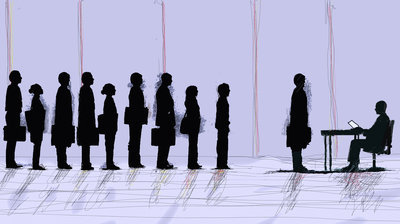 'The idea that everyone makes automatic, subconscious associations about people is not new. But now some companies are trying to reduce the impact of such biases in the workplace.' -- +NPR
'The idea that everyone makes automatic, subconscious associations about people is not new. But now some companies are trying to reduce the impact of such biases in the workplace.' -- +NPR
Published on September 01, 2015 15:21
The Making Of...Odili Donald Odita: 'Shadow and Light (for Julian Francis Abele), 2015'
 'In celebration of its 10th anniversary, the Nasher Museum of Art commissioned two murals by Odili Donald Odita to celebrate the connection between the museum and the Duke and Durham communities. The first mural has been completed on a wall inside the museum, and the second one is being painted on an outside wall of the downtown YMCA. In imagining the murals, Odita said he was inspired by the work of architect Julian Abele, an African-American who is credited with designing much of Duke's original West Campus, including its iconic Duke Chapel.' --
Duke Today
'In celebration of its 10th anniversary, the Nasher Museum of Art commissioned two murals by Odili Donald Odita to celebrate the connection between the museum and the Duke and Durham communities. The first mural has been completed on a wall inside the museum, and the second one is being painted on an outside wall of the downtown YMCA. In imagining the murals, Odita said he was inspired by the work of architect Julian Abele, an African-American who is credited with designing much of Duke's original West Campus, including its iconic Duke Chapel.' --
Duke Today
Published on September 01, 2015 15:05
August 31, 2015
"Black Free Thinkers": Afropunk Stands with #TransLivesMatter
 'An estimated 60,000 people came together at the 11th annual Afropunk Fest to watch headliners Lenny Kravitz, Grace Jones, and Lauryn Hill in Brooklyn, New York. "Afropunk is pretty much one of the ultimate voices for young black free thinkers," said singer/songwriter Jesse Boykins III. MSNBC interviewed artists Raury, Boykins, and Wangechi Mutu to capture their take on the Black Lives Matter and Trans Lives Matter movements." +MSNBC
'An estimated 60,000 people came together at the 11th annual Afropunk Fest to watch headliners Lenny Kravitz, Grace Jones, and Lauryn Hill in Brooklyn, New York. "Afropunk is pretty much one of the ultimate voices for young black free thinkers," said singer/songwriter Jesse Boykins III. MSNBC interviewed artists Raury, Boykins, and Wangechi Mutu to capture their take on the Black Lives Matter and Trans Lives Matter movements." +MSNBC
Published on August 31, 2015 12:35
Bryan Stevenson Talks Police Violence & the Presumption of Black Guilt
 'When the then 28-year-old Bryan Stevenson was threatened with a gun by a police officer, he knew better than to run away. But, he argues, young black men are still presumed guilty and dangerous by many Americans. Now executive director of the Equal Justice Initiative and part of President Barack Obama’s policing task force, he says only transitional justice can begin to heal America’s racial wounds.' -- +The Guardian
'When the then 28-year-old Bryan Stevenson was threatened with a gun by a police officer, he knew better than to run away. But, he argues, young black men are still presumed guilty and dangerous by many Americans. Now executive director of the Equal Justice Initiative and part of President Barack Obama’s policing task force, he says only transitional justice can begin to heal America’s racial wounds.' -- +The Guardian
Published on August 31, 2015 12:19
August 30, 2015
George Bush (Still) Doesn’t Care About Black People by Lawrence Ware
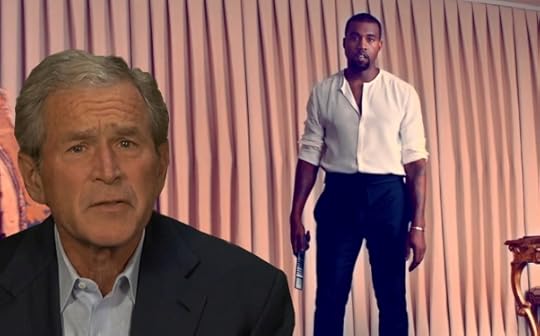 George Bush (Still) Doesn’t Care About Black Peopleby Lawrence Ware | @Law_Ware | NewBlackMan (in Exile)
George Bush (Still) Doesn’t Care About Black Peopleby Lawrence Ware | @Law_Ware | NewBlackMan (in Exile) I was sitting in a one-bedroom apartment watching the telethon for Hurricane Katrina when it happened. After a commercial break, Kanye West stood nervously looking like he was about to do something that would end his career. He was fidgety and sweating when he said it: “George Bush doesn’t care about Black people.” It was a transcendent moment for Black America.
Kanye articulated what we’d all felt watching the aftermath of Katrina: neglect. It was impactful, but also deeply misunderstood. Kanye West was ridiculed. Bush called it a nadir of his presidency. The backlash to his statement never diminished this unmistakable fact: Mr. West was right.
Kanye's assertion "George Bush doesn't care about Black People" is misunderstood if you read it as a statement only about Bush, the man. Kanye's statement comes from a democratic understanding of the president as the face of the American empire. Historically and in that moment, white Americans rarely have sympathy when people of color in their country suffer calamity. Like Bush’s concern for AIDS in Africa, white Americans will go on mission trips to feed orphans in other countries before they do anything for the poor in their own cities.
There has been much hand wringing about black people and police brutality, but that is only a small part of what ails black America. Poor healthcare, poverty, unequal sentencing, inadequate prison oversight, and de facto school segregation are all adverse conditions that disproportionately effect people of color in this country. There has been a great deal of talk about these ills, but aside from the republican contested Affordable Care Act, we have yet to see meaningful policy implemented to correct them. Most of these issues have become worse in the last 10 years because of the Bush administration. If the president is the face of America, then Kanye’s analysis still holds.
George W. Bush recently returned to New Orleans. He was invited to attend a ceremony marking the ten-year anniversary of Hurricane Katrina. When he spoke about the disaster, he said, "The storm nearly destroyed New Orleans…” President Bush is as wrong in this statement as Kanye was right a decade before.
The storm was not what nearly destroyed New Orleans. Poverty, racism, neglected levees, and his disastrous response was what nearly destroyed America’s most distinctive city. While I suspect the levees have been repaired and response times have improved, poverty and racism are still very real features of life in New Orleans and America.
George Bush was the face of America in 2005. He was ultimately responsible for the horrible response to the catastrophe that continues to disproportionately impact the lives of working-class black people in that city. The black middle class has left, poverty is above the national average, and what has been called rebuilding the city is really gentrification at the expense of the poor.
With that understanding, it is safe to say that Kanye was right. And because of the continued impact of Bush’s presidency, his words are relevant today. George Bush (still) doesn’t care about black people.
+++
Lawrence Ware is a professor of philosophy and diversity coordinator for Oklahoma State University’s Ethics Center. A frequent contributor to the publication The Democratic Left and contributing editor of the progressive publication RS: The Religious Left, he has also been a commentator on race for the HuffPost Live, CNN, and NPR.
Published on August 30, 2015 06:14
August 28, 2015
Camille A. Brown: Storytelling Through Dance
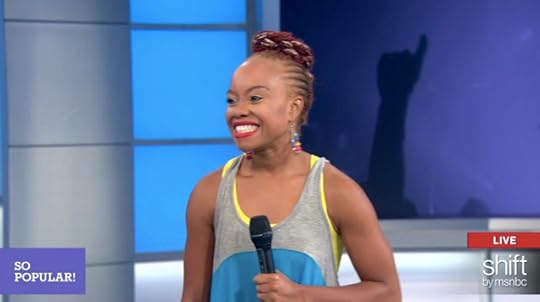 'Choreographer Camille A. Brown joins So POPular! host Janet Mock to discuss her new show, Black Girl: Linguistic Play which opens at the Joyce Theater in New York City on September 22nd.. Brown is also joined by dancer Catherine Foster as the two perform a piece from the new show.'
'Choreographer Camille A. Brown joins So POPular! host Janet Mock to discuss her new show, Black Girl: Linguistic Play which opens at the Joyce Theater in New York City on September 22nd.. Brown is also joined by dancer Catherine Foster as the two perform a piece from the new show.'
Published on August 28, 2015 21:02
#SummerSyllabus2015: #RaceMatters--A Panel Discussion at Duke University on 8/31
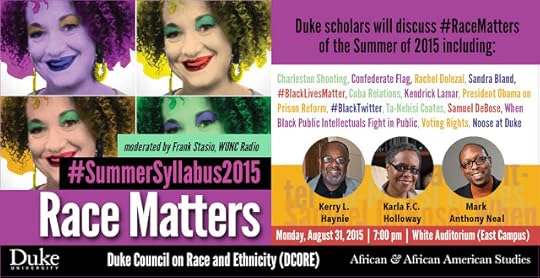 #SummerSyllabus2015: #RaceMattersMonday, August 31, 2015 @ 7:00 pmDuke University (East Campus)White Lecture Hall
#SummerSyllabus2015: #RaceMattersMonday, August 31, 2015 @ 7:00 pmDuke University (East Campus)White Lecture Hall A faculty panel discussion on the numerous race-related incidents that occurred this summer; moderated by NPR host Frank Stasio
Inspired by the #CharlestonSyllabus hashtag that circulated in the aftermath of the shooting death of 9 African-American parishioners in Charleston’s Mother Emanuel AME Church, several Duke University faculty will participate in a panel discussion to help educate and reveal the nuances of race in America.
The discussion, #SummerSyllabus2015: #RaceMatters, will be held at 7 p.m. Monday, Aug. 31 in White Lecture Hall on Duke’s East Campus. It will feature professors Kerry Haynie (Political Science), Karla F.C. Holloway (English) and Mark Anthony Neal (African & African American Studies) in open dialogue about the steady stream of racial incidents that defined summer 2015.
The faculty will address topics such as:the Charleston shootingthe Confederate flag debateSandra Bland’s death in police custodythe police killing of Samuel DeBosethe #BlackLivesMatter movementthe role of #BlackTwitterauthor Ta-Nehisi Coates’ latest bookthe noose hanging on the Duke University quadand the spectacle of Rachel Dolezal, the former NAACP Spokane chapter president who lied about her race.
The conversation will be moderated by Frank Stasio, host of WUNC’s signature program “The State of Things.” For those unable to attend, the event will be recorded and posted online.
The event is the first hosted by the Duke Councils on Race and Ethnicity (DCORE), co-directed by Professors Haynie and Neal.
Published on August 28, 2015 14:42
August 27, 2015
Why Actor Wendell Pierce Didn’t Wait for Someone Else to Rebuild his NOLA Neighborhood
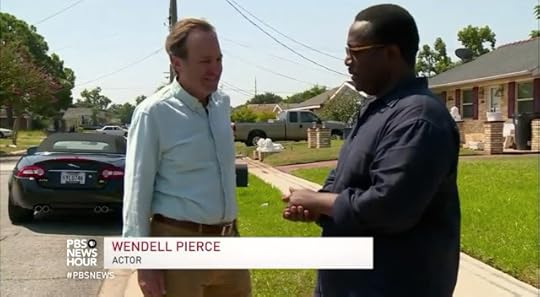 'Wendell Pierce is perhaps best known for his acting roles on The Wire and Treme. Lately, he’s taken on a different kind of role, as community rebuilder. In the wake of Hurricane Katrina, Pierce invested time, money and art into to bringing back the neighborhood where he grew up. Ten years later, +PBS NewsHour's Jeffrey Brown accompanies Pierce for a look at his home that has not only survived but thrived.'
'Wendell Pierce is perhaps best known for his acting roles on The Wire and Treme. Lately, he’s taken on a different kind of role, as community rebuilder. In the wake of Hurricane Katrina, Pierce invested time, money and art into to bringing back the neighborhood where he grew up. Ten years later, +PBS NewsHour's Jeffrey Brown accompanies Pierce for a look at his home that has not only survived but thrived.'
Published on August 27, 2015 20:29
Mark Anthony Neal's Blog
- Mark Anthony Neal's profile
- 30 followers
Mark Anthony Neal isn't a Goodreads Author
(yet),
but they
do have a blog,
so here are some recent posts imported from
their feed.



